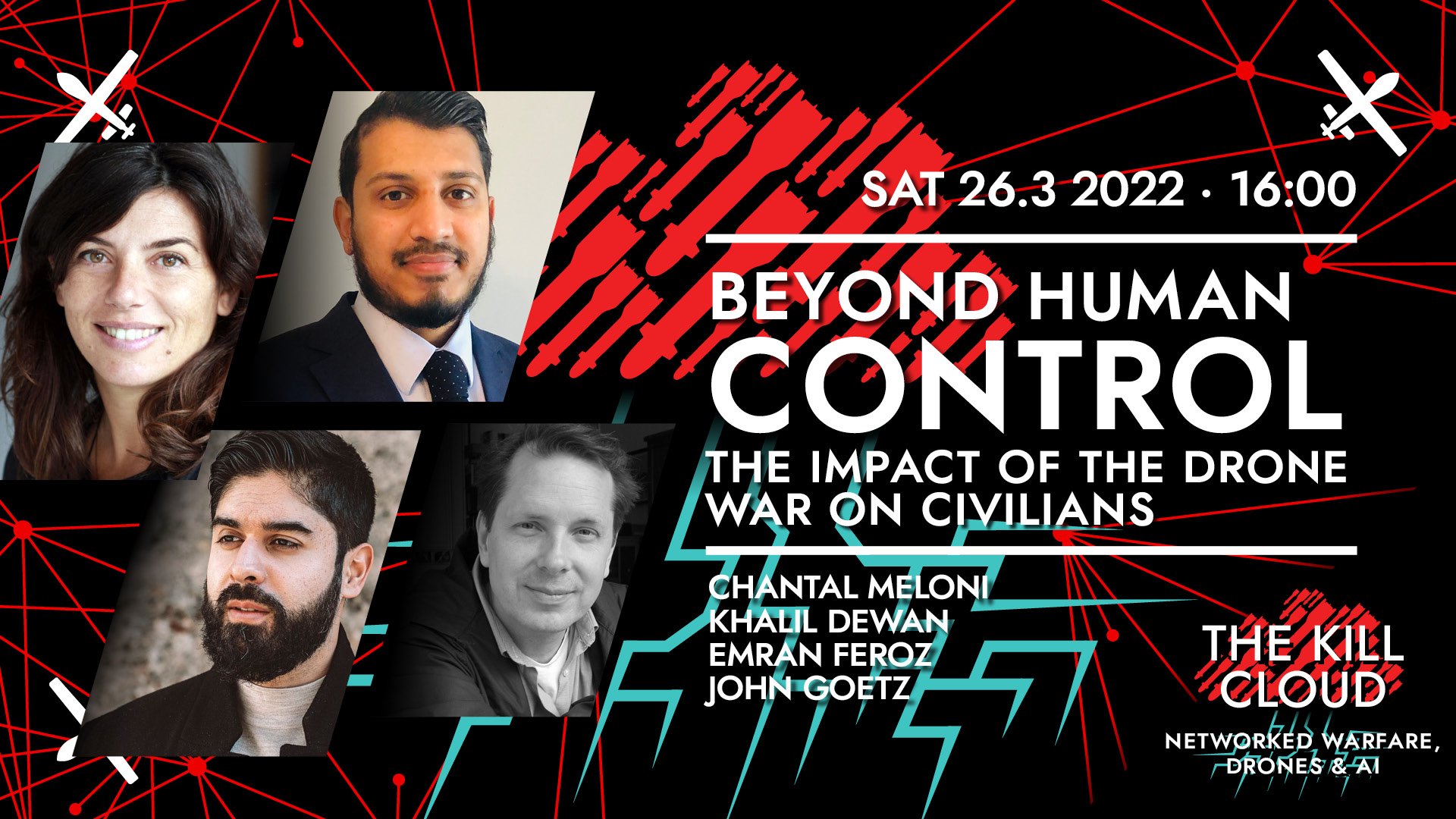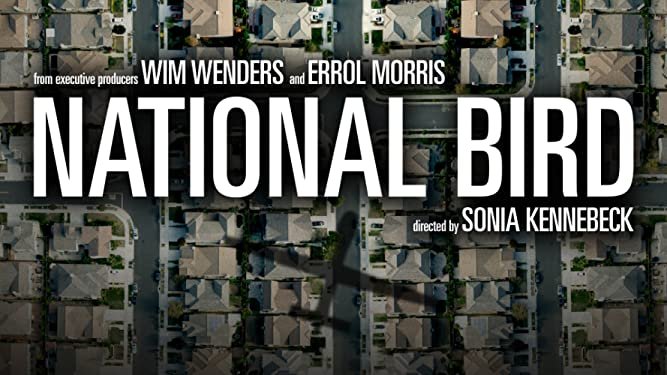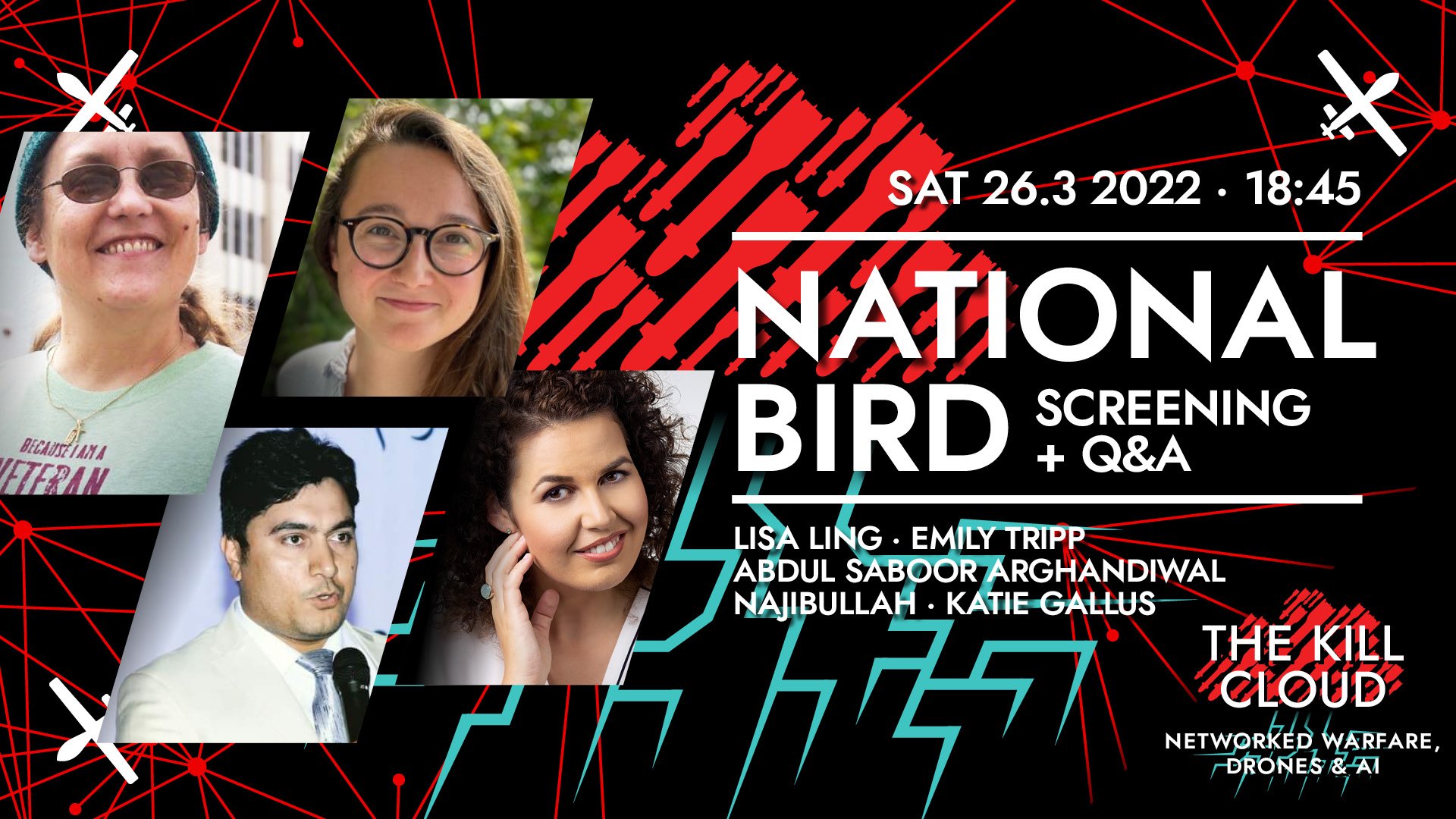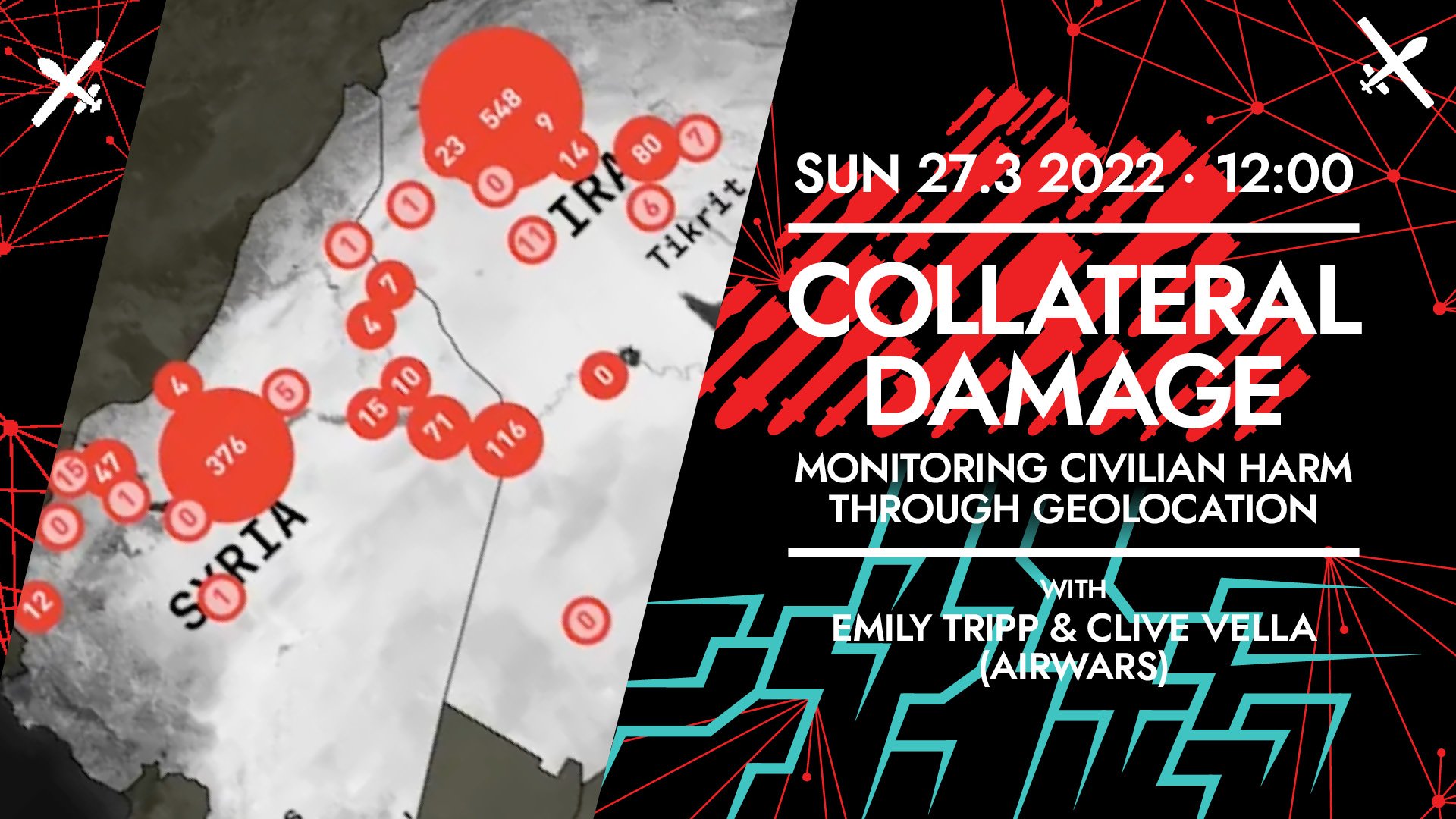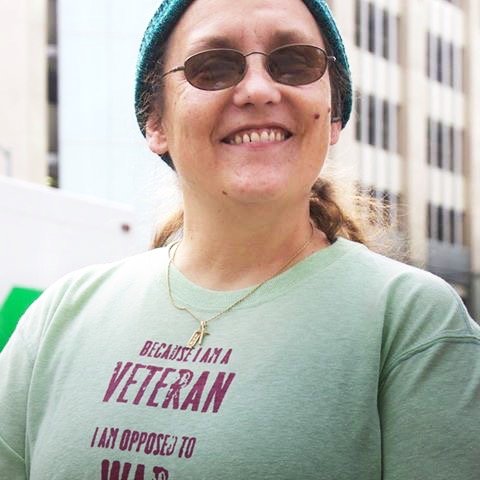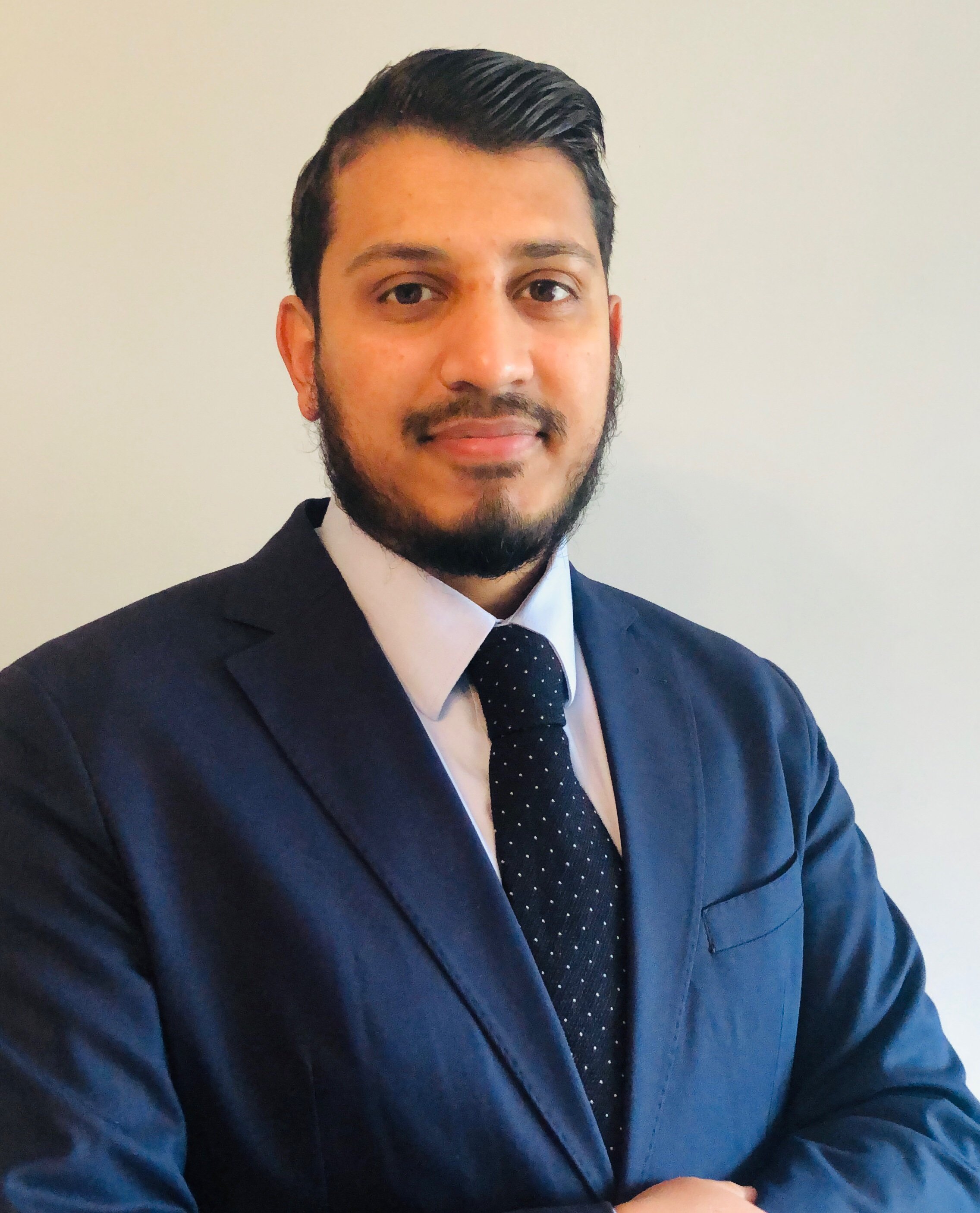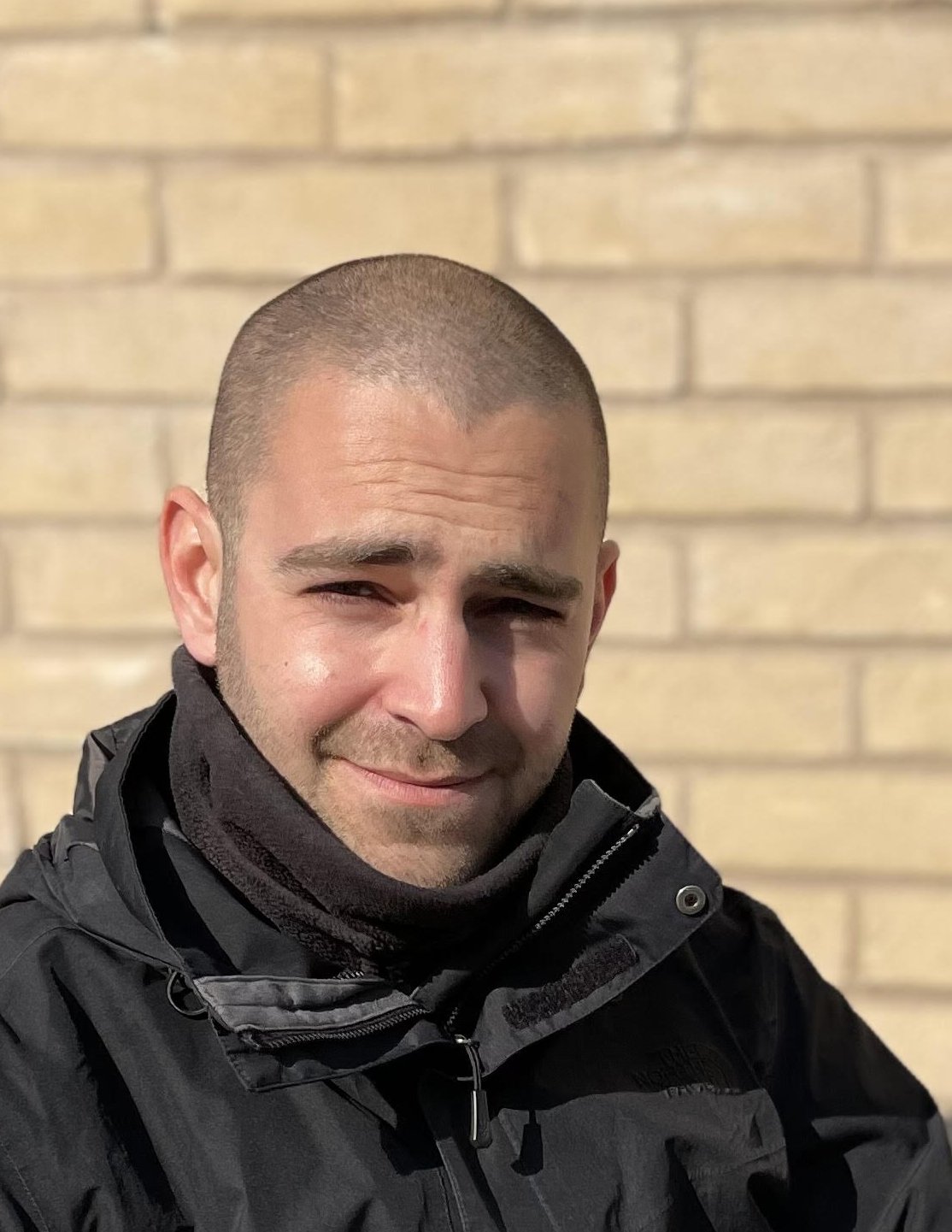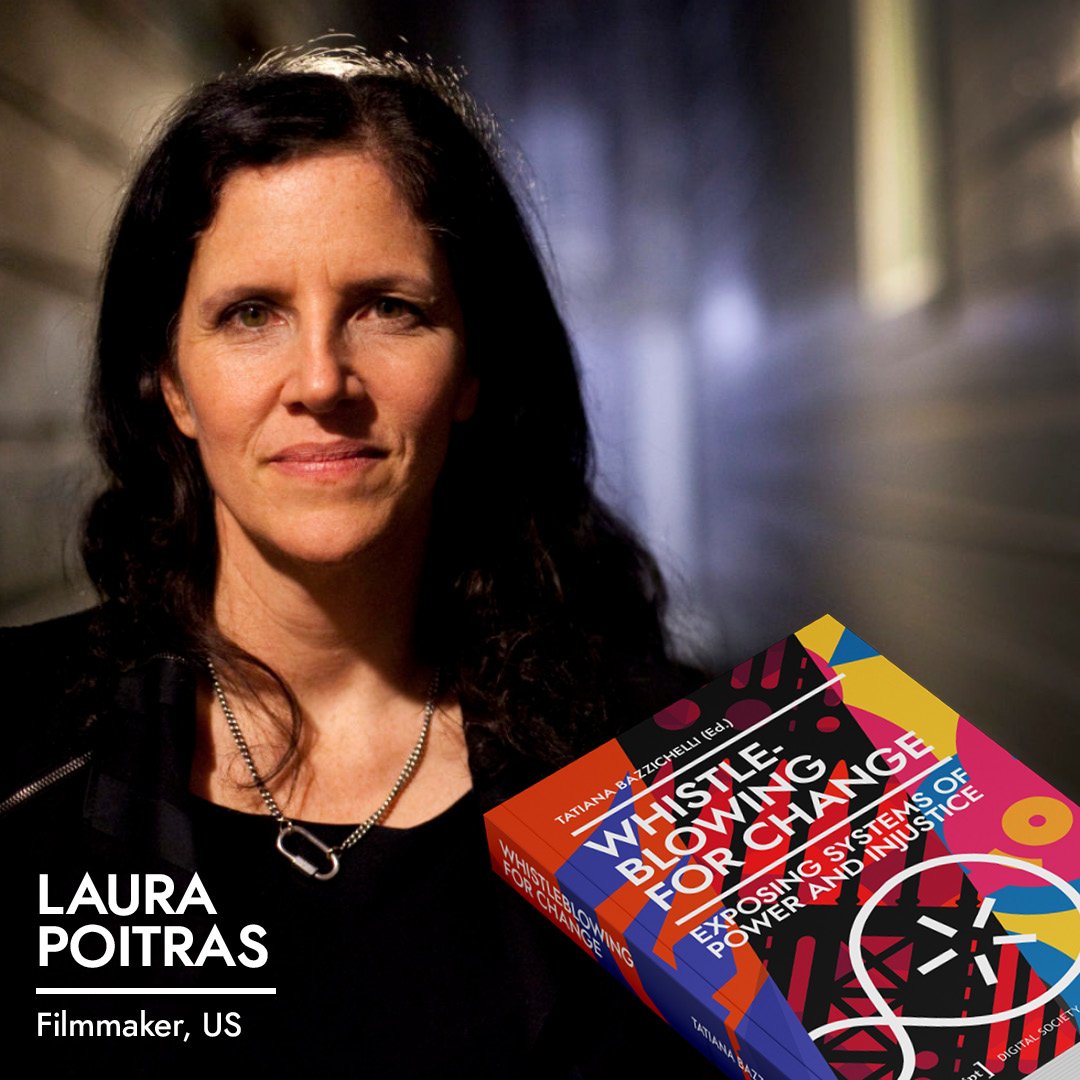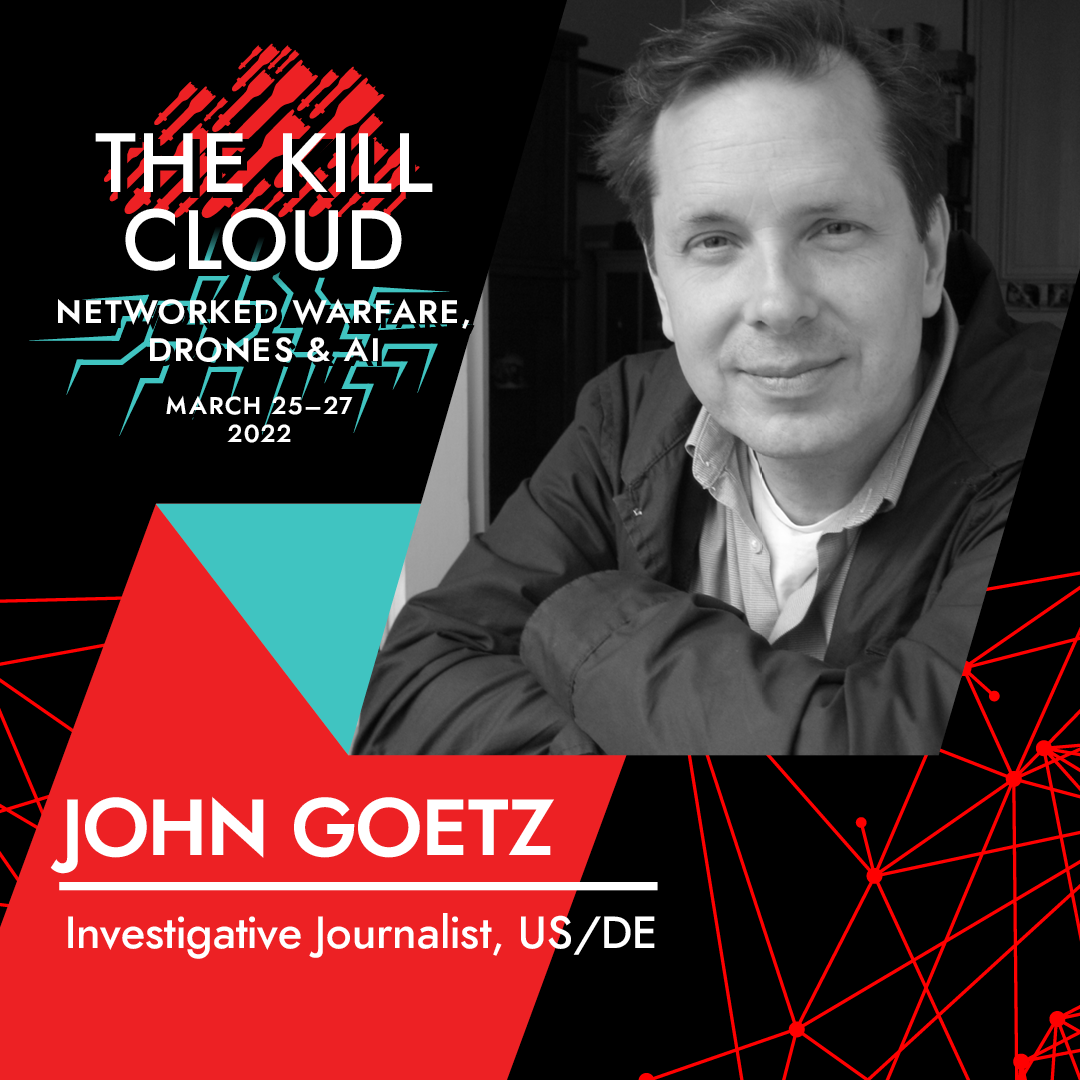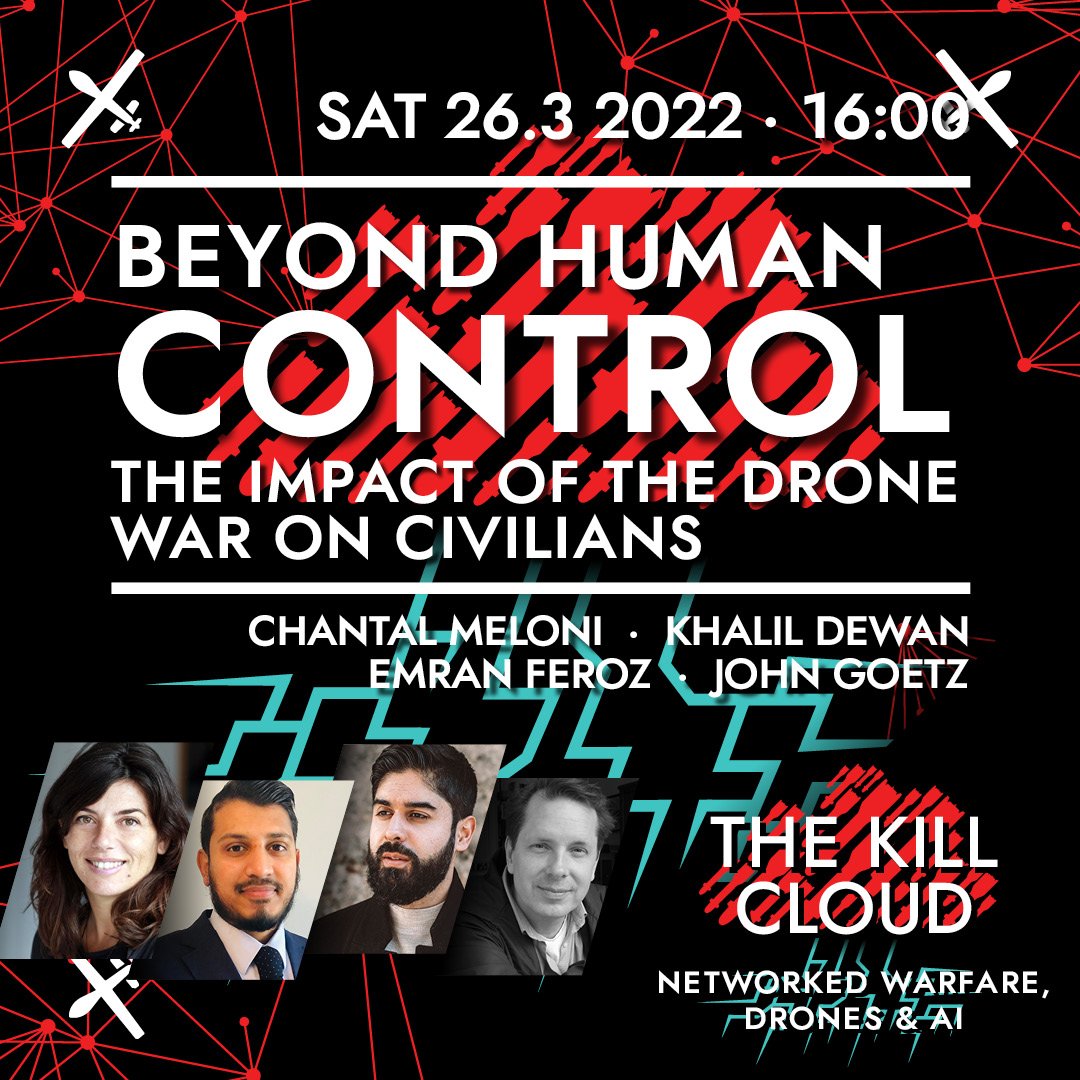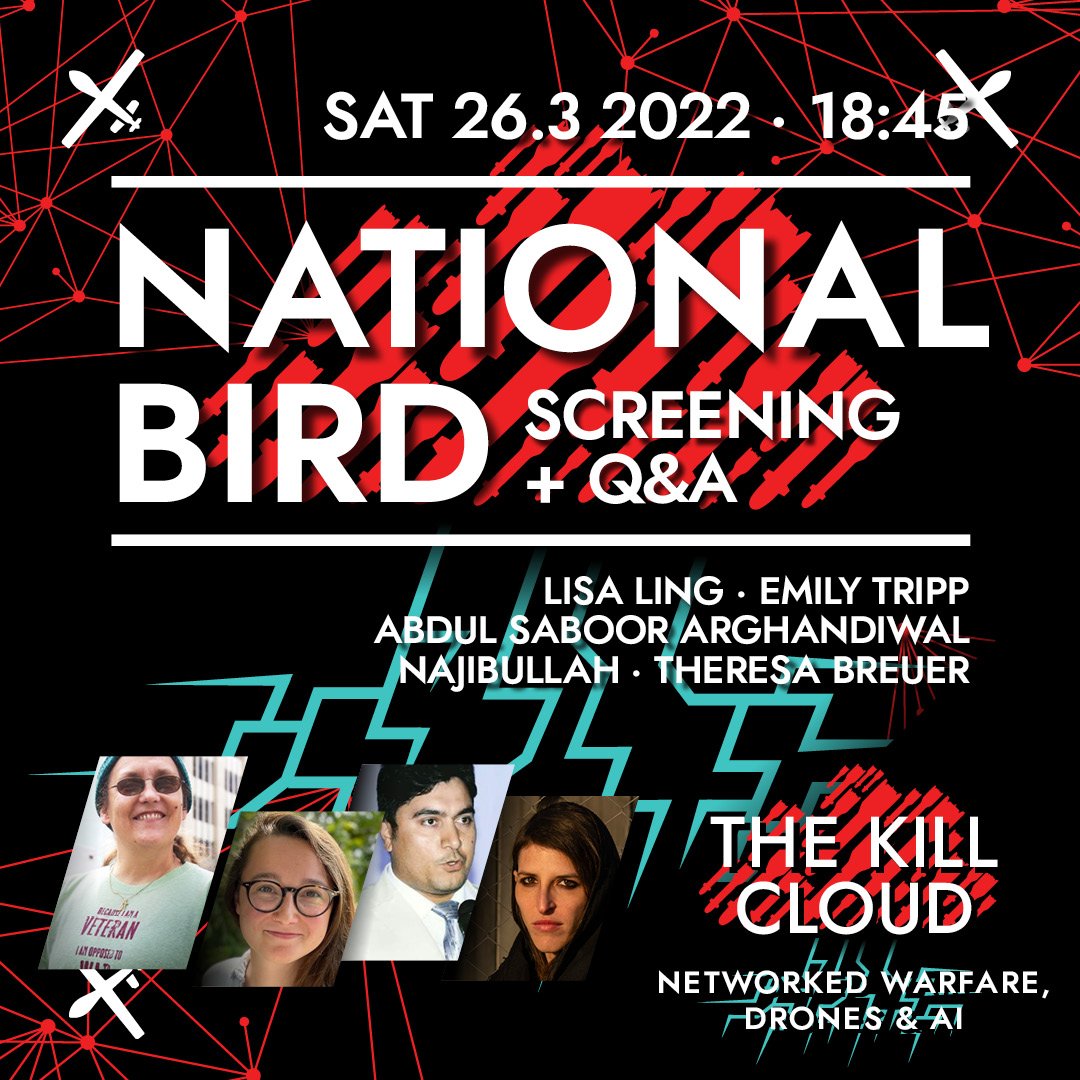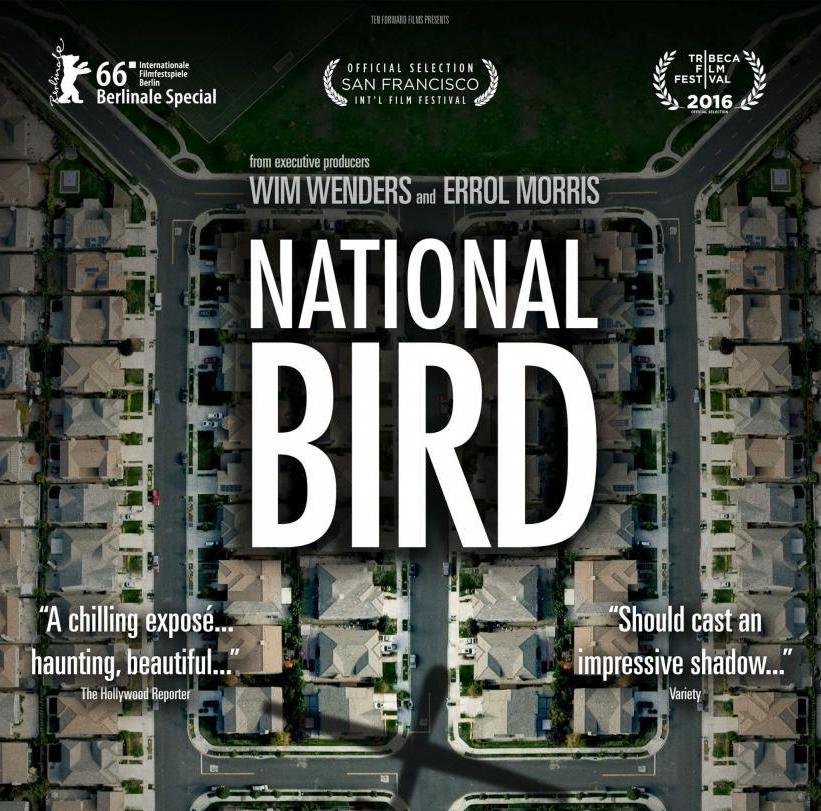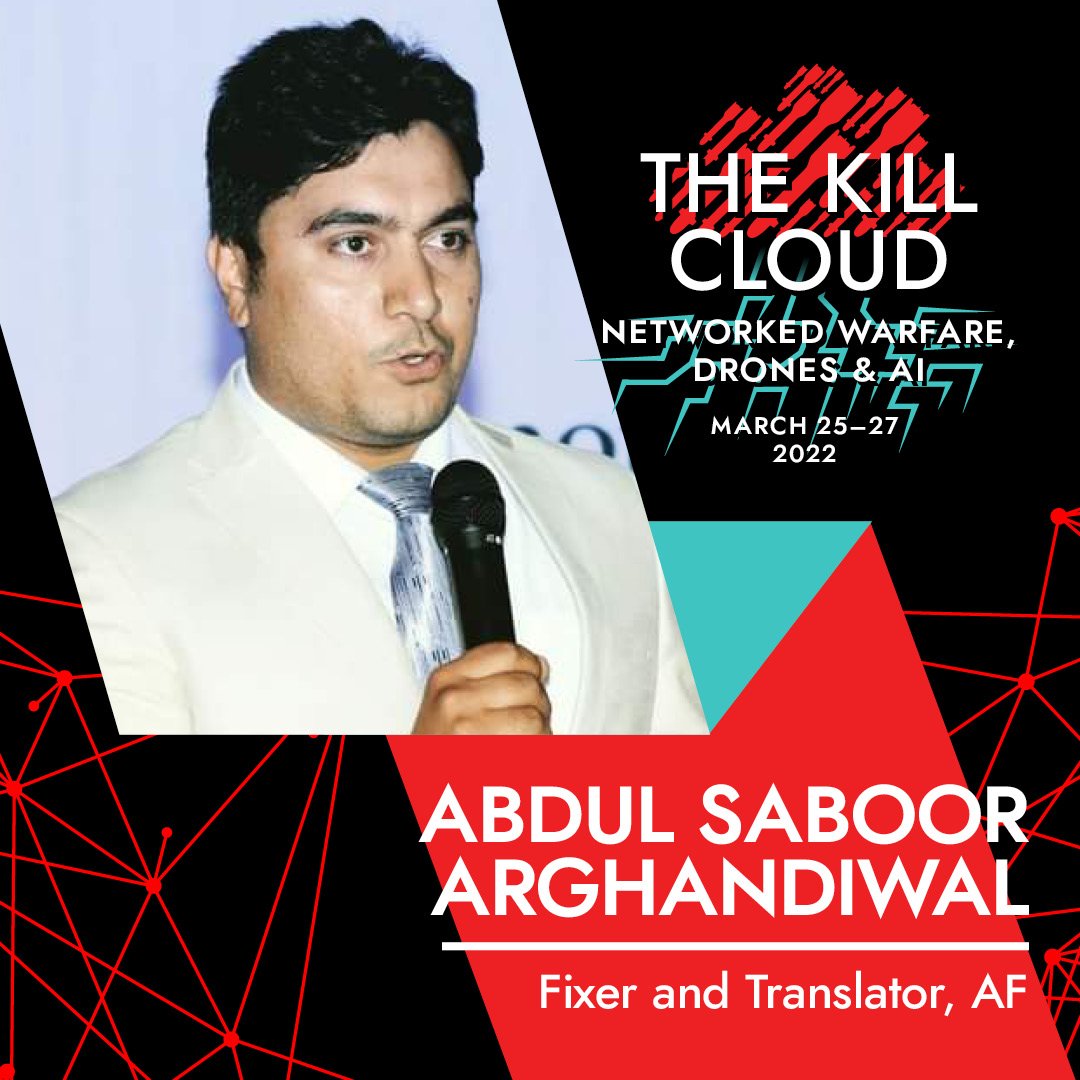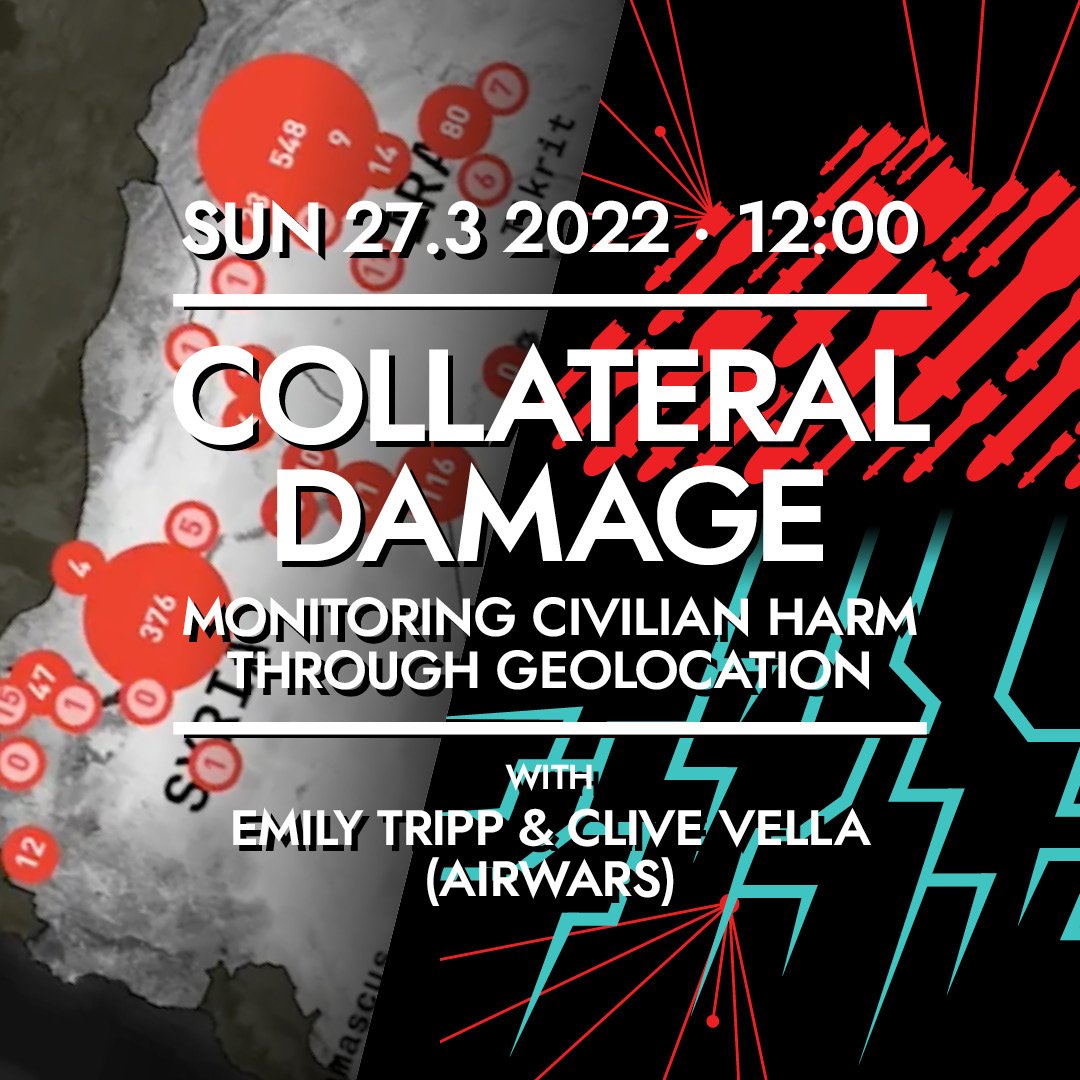#DNL26 · March 25–27 · 2022
THE KILL CLOUD
Networked Warfare, Drones & AI
THE 26TH CONFERENCE OF THE DISRUPTION NETWORK LAB
KUNSTQUARTIER BETHANIEN - BERLIN & ON STREAMING
Challenging AI powered global military programmes & targeted killings through civic action and whistleblowing
26TH CONFERENCE OF THE DISRUPTION NETWORK LAB. CURATED BY TATIANA BAZZICHELLI. WORKSHOPS CURATED BY Nada Bakr.
LOCATION: STUDIO 1, KUNSTQUARTIER BETHANIEN, MARIANNENPLATZ 2, 10997 BERLIN
STREAMED FOR FREE (FILM SCREENING + Q&A EXCLUDED).
No tickets required to watch the livestream. The film National Bird + Q&A will not be streamed.
COVID-19 measures: In accordance with Berlin regulations you are required to show proof of full vaccination (booster not required) or recoverery or present a current negative test result (rapid tests less than 24h old or PCR test less than 48h). An FFP2 mask is required at all times.
BACK TO TOP
CONFERENCE SCHEDULE
Friday, March 25 · 2022
17:00 · Doors Open
17:30—17:40 · INTRODUCTION
Tatiana Bazzichelli (Artistic Director, Disruption Network Lab, IT/DE)
17:40–19:00 · KEYNOTE: The Kill Cloud: Real World Implications of Network Centric Warfare
Lisa Ling (Whistleblower, Former Technical Sergeant, US Air Force Drone Surveillance Programme, US), Cian Westmoreland (Whistleblower, Former US Air Force Drone Technician, US). Moderated by Daniel Eriksson (CEO of Transparency International, SE/DE).
19:30–21:00 PANEL: The Future of War: Drone Surveillance, Killer Robots & Lethal AI Weapons
Laura Nolan (Member, ICRAC - International Committee for Robot Arms Control, IE), Jack Poulson (Executive Director, Tech Inquiry, US), Taniel Yusef (Women's International League for Peace & Freedom, UK). Moderated by Theresa Züger (Research Group Lead: Public Interest AI, AI & Society Lab, DE).
Saturday March 26, 2022
15:30 · Doors Open
16:00–17:30 · PANEL: Beyond Human Control: The impact of the Drone War on Civilians
Chantal Meloni (Criminal Lawyer, ECCHR & Professor, University of Milan, IT/DE), Khalil Dewan (Head of Investigations, Stoke White Investigations, UK), Emran Feroz (Journalist and Author, AF/AT/DE). Moderated by John Goetz (Investigative Journalist, NDR, US/DE) .
17:45–18:15 · INSIGHT: The Art of War, the Moral Law & the Art of Whistleblowing
Brandon Bryant (Whistleblower, Former US Air Force Drone Operator, US), Introduced by Tatiana Bazzichelli (Artistic Director, Disruption Network Lab, IT/DE).
18:45–20:20 · FILM SCREENING: National Bird (not streamed)
Documentary, 2016, US/DE ‧ 1h 32m, English language, directed by Sonia Kennebeck. Featuring Daniel Hale (Private Contractor and Former Signals Intelligence Analyst), Lisa Ling (Former Technical Sergeant on Drone Surveillance System), Heather Linebaugh (Former Drone Imagery Analyst), Jesselyn Radack, Asma Nazihi Eschen, and others. Produced by: Sonia Kennebeck and Ines Hoffmann Kanna. Cinematography: Torsten Lapp. Edited by Maxine Goedicke. Music by Insa Rudolph. Executive Producers: Wim Wenders, Errol Morris. Website
20:30–21:30 · National Bird Q&A (not streamed)
With Lisa Ling (Whistleblower, Former Technical Sergeant, Drone Surveillance Programme, US), Emily Tripp (Research Manager, Airwars, UK), Abdul Saboor Arghandiwal (Fixer and Translator, AF), Najibullah (Afghan Representative of Global Exchange, National Bird Afghanistan Production Coordinator, AF). Moderated by Katie Gallus (Geographer, Moderator & Journalist, DE).
Sunday March 27, 2022
12:00–14:00 · WORKSHOP · Collateral Damage: Monitoring Civilian Harm Through Geolocation
With Emily Tripp (Research Manager, Airwars, UK) & Clive Vella (Geolocation Specialist, Airwars, UK).
15:30–17:30 · WORKSHOP · To Play or be Played: Uncovering Gamification Techniques
With: Agnese Trocchi (Digital Communications Manager, Disruption Network Lab, Educator, IT) and Jacopo Anderlini (Researcher, Systems/Operations Engineer, IT/DE)
BACK TO TOP
CONFERENCE INTRODUCTION
Challenging AI powered global military programmes & targeted killings through civic action and whistleblowing
Funded by:
Senatsverwaltung für Kultur und Europa (Senate Department for Culture and Europa, Berlin), The Reva and David Logan Foundation (grant provided by NEO Philanthropy), KULTUR.GEMEINSCHAFTEN bei der Kulturstiftung der Länder, Beauftragte der Bundesregierung für Kultur und Medien, Konjunkturprogramm für den Kultur- und Medienbereich NEUSTART KULTUR (KULTUR.GEMEINSCHAFTEN, German Federal Cultural Foundation, BKM/German Government Commissioner for Culture and the Media, NEUSTART KULTUR/Restart Culture Programme of the Cultural and Media Sector).
In partnership with the Friedrich-Ebert-Stiftung.
In cooperation with: Global Voices.
In collaboration with: Transparency International, AIRWARS, Research group Inequality and digital Soverignty (Weizenbaum Institut), School of Machines, Making, and Make-Believe.
Partner Venues: Kunstraum Kreuzberg /Bethanien, ACUD Macht Neu.
Outreach Partners: Aksioma, Institute for Contemporary Art Ljubljana.
Media Partners: taz, Il Mitte.
26TH CONFERENCE OF THE DISRUPTION NETWORK LAB. CURATED BY TATIANA BAZZICHELLI. WORKSHOPS CURATED BY Nada Bakr.
LOCATION: STUDIO 1, KUNSTQUARTIER BETHANIEN, MARIANNENPLATZ 2, 10997 BERLIN
STREAMED FOR FREE (FILM SCREENING + Q&A EXCLUDED).
The dramatic situation in Ukraine and the power takeover of the Taliban in Afghanistan demonstrate that war and global humanitarian crises are burning issues at the top of our political and media agendas. But in the meantime, a gigantic data driven, global military infrastructure is being put up – mostly unnoticed by people and uncommented by the media. What is the future of war? Which political and technological strategies are already in use? What can whistleblowing and other acts of civil disobedience achieve in this power game?
In March 25-27, the conference THE KILL CLOUD opens the programme of the Disruption Network Lab 2022. This event interlinks the idea of exposing injustice with the debate on warfare whistleblowing, referring to the use of AI technologies and satellites for surveillance purposes with the aim of enabling targeted killings.
We analyse which geopolitical alliances and power relations are hidden in the use of AI technology, Global Positioning System (GPS), and satellites.The event attempts to provide some understanding into ethical problems with the use of AI and satellite technology to enable targeted killing via unmanned aerial vehicles (UAVs), as well as an insight into how atrocities such as the collateral bombing of civilians without soldiers can happen, as we witnessed in Afghanistan in 2021.
Diffusion of responsibility and desensitisation of conflicts are characterising the network of modern warfare, which is based on a complex interconnection of technologies and systems of hierarchy. Keynote speakers are drone whistleblowers Cian Westmoreland and Lisa Ling, co-authors of The Kill Cloud: Real World Implications of Network Centric Warfare, a revealing book chapter of our anthology Whistleblowing for Change (transcript Verlag, 2021), which gives the title to this conference.
According to Lisa Ling and Cian Westmoreland, speaking on Friday March 25, the “Kill Cloud” is a rapidly growing networked infrastructure of global reach with the primary intent of dominating every spectrum of warfare, including, space, cyberspace, and the electromagnetic spectrum itself. They point out that modern network centric warfare has been hidden behind the captivating image of the drone, yet these systems are vastly more complex, insidious, ubiquitous, and inaccurate than the public is aware, and its colonial underpinnings continue to bring endless war to societies across the globe.
What are the achievements done by courageous acts of whistleblowing in the military framework? How can we effectively track down the hidden strategies that move targeted-killings?
The conference reconnects thematically with our first Disruption Network Lab event in April 2015, DRONES: Eyes From A Distance, inviting once again to Berlin former drone operator Brandon Bryant, the first whistleblower that analysed and exposed drone-systems and their strategies. It also connects the network of international whistleblowers with the city of Berlin, as well as the German policy experts of the matter.
We believe that it is crucial to keep alive such debate in the city of Berlin and in Germany in general, considering the presence of the U.S. air force base in Ramstein, described from some sources (see the 2015 article by Jeremy Scahill) as the site of a satellite relay station that enables drone operators in the American Southwest to communicate with their remote aircraft in Yemen, Somalia, Afghanistan and other targeted countries.
In the context of this conference, on Saturday March 26, we screen the film National Bird by Sonia Kennebeck, a rare insight into the U.S. drone program through the eyes of three whistleblowers, Lisa Ling (who will be present for the Q&A), former drone imagery analyst Heather Linebaugh, and former signals intelligence analyst Daniel Hale, who worked for the National Security Agency. Daniel was convicted under the World War I-era Espionage Act for leaking information about the U.S. drone programme. He is currently serving a 45-month sentence in federal prison.
Because of Daniel’s disclosures, the public learned that during a five-month period in Afghanistan, 90 percent of those killed by U.S. airstrikes were not the intended targets. Daniel explained that his actions were driven by a desire to repent for the harm that he had witnessed and been a part of creating. He delivered this statement to a courtroom on July 27, 2021, on the date of his sentencing in Alexandria, Virginia (I Believe That It Is Wrong To Kill, published in our book Whistleblowing for Change).
With this conference, we want to investigate with our public the crucial topic of the drone war and its more recent developments, reflecting on the impact that networked warfare and a strategic usage of AI have on the lives of many civilians.
The book:
Whistleblowing for Change:
Exposing Systems of Power & Injustice
The courageous acts of whistleblowing that inspired the world over the past few years have changed our perception of surveillance and control in today's information society. But what are the wider effects of whistleblowing as an act of dissent on politics, society, and the arts? How does it contribute to new courses of action, digital tools, and contents? This urgent intervention based on the work of Berlin's Disruption Network Lab examines this growing phenomenon, offering interdisciplinary pathways to empower the public by investigating whistleblowing as a developing political practice that has the ability to provoke change from within.
BACK TO TOP
Full Programme
Friday, March 25 · 2022
17:30—17:40 · OPENING
Tatiana Bazzichelli (Artistic Director, Disruption Network Lab, IT/DE)
17:40–19:00 · KEYNOTE
The Kill Cloud: Real World Implications of Network Centric Warfare
Lisa Ling (Whistleblower, Former Technical Sergeant, US Air Force Drone Surveillance Programme, US), Cian Westmoreland (Whistleblower, Former US Air Force Drone Technician, US). Moderated by Daniel Eriksson (CEO of Transparency International, SE/DE).
This keynote presentation introduces what Lisa Ling and Cian Westmoreland have come to call the “Kill Cloud,” a rapidly growing networked infrastructure of global reach with the primary intent of dominating every spectrum of warfare. There is a need for a critical analysis of how the “Kill Cloud” operates, from its ideological underpinnings, its ambitions, to the technological approach being pursued to achieve global military dominance over all battlespace dimensions including, space, cyberspace, and the electromagnetic spectrum itself. Modern network centric warfare has been hidden behind the captivating image of the drone, yet these systems are vastly more complex, insidious, ubiquitous, and inaccurate than the public is aware, and its colonial underpinnings continue to bring endless war to societies across the globe. The Kill Cloud has emerged as an immense and evolving system of systems hastening the expansion of the Global War on Terror. This talk pays close attention to the US military drone programme’s contribution to the framing and evolution of modern network centric war. This Kill Cloud has far-reaching consequences beyond those of what have been traditionally considered in warfare. Read the full chapter in the book Whistleblowing for Change (Tatiana Bazzichelli, Ed. Transcript Verlag, 2021).
19:30–21:00 · PANEL
The Future of War: Drone Surveillance, Killer Robots & Lethal AI Weapons
Laura Nolan (Member, ICRAC - International Committee for Robot Arms Control, IE), Jack Poulson (Executive Director, Tech Inquiry, US), Taniel Yusef (Women's International League for Peace & Freedom, UK). Moderated by Theresa Züger (Research Group Lead: Public Interest AI, AI & Society Lab, DE).
This panel focuses on the current military artificial intelligence arms race and the implications of private companies in deploying AI, big data, and deep learning to war zones. In 2017 the U.S. Department of Defense launched Project Maven, to explore the potential of establishing an Algorithmic Warfare Cross-Functional Team, overseen by the undersecretary of defense for. Private companies like Google got involved in the project, asking engineers and tech workers to contribute to the development of military autonomous weapons systems, causing deep concerns, which were expressed by Google employees on an open letter to withdraw from Project Maven and to commit to not weaponizing its technology. Among the former Google employees that pointed out the dangers around Project Maven, were Jack Poulson and Laura Nolan, today respectively Executive Director and Treasurer of Board of Tech Inquiry. Google employees exposed the risks to use artificial intelligence technology to analyse drone surveillance footage and refused to implicate their work in the practice of targeted killings and the so-called signature strikes and pattern-of-life strikes – which raised significant questions of racial and gender bias, as well as frequent human mistakes in target identification and strike analysis. Today the deployment of AI for war conflicts reached an even more pervasive level: Russia, China, United States, United Kingdom, Israel, South Korea, France, Germany, Italy, and Sweden, to name a few, are developing lethal autonomous weapons. The Stop Killer Robots Campaign, presented by Taniel Yusef during UN talks in Geneva in August 2021, has called for all AI killing machines not operated by humans to be banned.The campaign emphasises the need for a clear legally binding prohibition on autonomous weapons that target humans. As pointed out by Laura Nolan, killer robots have the potential to do “calamitous things that they were not originally programmed for”. This panel will give a history of the companies involved in common operating picture production, addressing how this ties into the data fusion side of Project Maven, and will discuss the present and future threads posed by the use of AI in Algorithmic Warfare and automated weapons systems.
Saturday, March 26 · 2022
16:00–17:30 · PANEL
Beyond Human Control: The impact of the Drone War on Civilians
Chantal Meloni (Criminal Lawyer, ECCHR & Professor, University of Milan, IT/DE), Khalil Dewan (Head of Investigations, Stoke White Investigations, UK), Emran Feroz (Journalist and Author, AF/AT/DE). Moderated by John Goetz (Investigative Journalist, NDR, US/DE).
This panel addresses the legal and political implications of drone strikes. For over 10 years, NGOs, civil society organisations, victims’ representatives, in partnership with the affected communities on the ground, have denounced the unlawfulness of the drone war from the international law and human rights law perspective. They also filed several legal interventions, in the USA and in Germany, in Italy, in the UK and other countries, to achieve more transparency and assess the responsibilities for such unlawful operations, including State-administrative law and individual-criminal law responsibilities. The hurdles encountered in this kind of litigation are enormous and often result in the impossibility for the victims to achieve any justice. Chantal Meloni will present a number of cases – some of them ongoing – that, notwithstanding the difficulties, are worth being told and analysed carefully. She will discuss the involvement of air bases in Europe in the US drone program, such as the US military bases like Ramstein in Germany and Sigonella in Italy, that bear shared responsibility for allowing their territory to be used to facilitate US drone strikes. Khalil Dewan will focus on the legal ramifications of using AI and autonomy within the kill cloud vis-à-vis international law for targeted killings and drone strikes. Specifically, he will introduce the armed reaper drone, that is more than just 'fibre-glass' hovering in the sky-line: it is network-centric warfare which is moving beyond human control to the inclusion of artificial intelligence (AI) and lethal autonomous weapon systems (LAWs) in locating targets, making lethal decisions and permitting the use of multi-strike capability for a number of states.
Finally, Emran Feroz will connect the subject of the use of drones for targeted killings and the impact on civilian lives to the topics of his last book, Der längste Krieg ("The longest war"), which was published in 2021 during the time of the Taliban offensive in Afghanistan, describes the war on terror from an Afghan perspective for the first time. The book highlights the horror of war on civilians, reflecting on themes that are more and more actual considering the current extremely dangerous situation in Afghanistan and the present war in Ukraine that we are all witnessing.
17:45–18:15 · INSIGHT
The Art of War, the Moral Law & the Art of Whistleblowing
Brandon Bryant (Whistleblower, Former US Air Force Drone Operator, US), Introduced by Tatiana Bazzichelli (Artistic Director, Disruption Network Lab, IT/DE).
Brandon Bryant, MQ-1B Predator sensor operator who joined the US Air Force from 2005 to 2011, speaks from the perspective of his personal experience as a US veteran. Brandon Bryant was among the first drone operators to speak out publicly about conditions of the unmanned aerial vehicles’ programme of which he was a member from 2006 to 2011, particularly the US Air Force Predator programme, which was responsible for several drone strikes and attacks overseas. In describing a personal war experience, he deals with questions of power, technology, and ethics, and how they shape our personal life when we enter directly into contact with warfare using remotely controlled technologies. Both invisible and remote, these military systems create a surreal temporary zone in which the operator works; a zone where life and death intertwine. This talk reflects on the importance of generating public awareness and critical thinking towards power structures, and most of all, the act of changing perspective and readdressing and revising the artificial dichotomy of whistleblowers as being either heroes or traitors.
18:45–20:20 · FILM SCREENING (not streamed)
National Bird
Documentary, 2016, US/DE ‧ 1h 32m, English language, directed by Sonia Kennebeck. Featuring Daniel Hale (Private Contractor and Former Signals Intelligence Analyst), Lisa Ling (Former Technical Sergeant on Drone Surveillance System), Heather Linebaugh (Former Drone Imagery Analyst), Jesselyn Radack, Asma Nazihi Eschen, and others. Produced by: Sonia Kennebeck and Ines Hoffmann Kanna. Cinematography: Torsten Lapp. Edited by Maxine Goedicke. Music by Insa Rudolph. Executive Producers: Wim Wenders, Errol Morris.
National Bird follows the dramatic journey of three whistleblowers who are determined to break the silence around one of the most controversial current affairs issues of our time: the secret U.S. drone war. At the center of the film are three U.S. military veterans. Plagued by guilt over participating in the killing of faceless people in foreign countries, they decide to speak out publicly, despite the possible consequences.
Their stories take dramatic turns, leading one of the protagonists to Afghanistan where she learns about a horrendous incident. But her journey also gives hope for peace and redemption. National Bird gives rare insight into the U.S. drone program through the eyes of veterans and survivors, connecting their stories as never seen before in a documentary. Its images haunt the audience and bring a faraway issue close to home.
20:30–21:30 · FILM Q&A (not streamed)
National Bird: Q&A
Lisa Ling (Whistleblower, Former Technical Sergeant, Drone Surveillance Programme, US), Emily Tripp (Research Manager, Airwars, UK), Abdul Saboor Arghandiwal (Fixer and Translator, AF), Najibullah (Afghan Representative of Global Exchange, National Bird Afghanistan Production Coordinator, AF). Moderated by Katie Gallus (Geographer, Moderator & Journalist, DE).
The screening of National Bird is followed by a panel conversation with Lisa Ling, one of the protagonists of the film, former technical sergeant of U.S. Drone Surveillance Programme, that during the making of the documentary, travelled with Sonia Kennebeck and her crew to Afghanistan to research the impact of drone strikes for people on the ground. She will be in dialogue with Najibullah, that worked in Afghanistan as production coordinator for the film. The panel will also involve Afghan fixer and translator Abdul Saboor Arghandiwal, and Emily Tripp, research manager at Airwars, a UK-based transparency organisation assessing civilian harms and monitoring air wars and air strikes. The conversation will provide a deeper understanding of the topics presented in the film, in relation to the drone war and civilian causalities, to help improve understanding of how recent wars have impacted on civilians. Particular attention will be dedicated to the present development of the situation in Afghanistan and the debate will be expanded to the current war conflicts seeking transparency and accountability. The conversation will be moderated by geographer, moderator and journalist Katie Gallus.
BACK TO TOP
Workshops · Sunday, March 27 · 2022
12:00–14:00 WORKSHOP · Tickets
Collateral Damage: Civilian Harm Through all-source monitoring and Geolocation
Emily Tripp (Research Manager, Airwars, UK) & Clive Vella (Geolocation Specialist, Airwars, UK).
Understanding civilian harm in Iraq and Syria – identifying patterns of civilian harm from Russian actions in Syria, and US-led Coalition actions in the war against ISIS.
Expanding the influence of social media and ever-innovating technology, including widespread access to smartphones, means that millions of people have become empowered to record incidents of civilian harm; we have consistently tracked this across conflicts in Syria, Iraq, Libya, Yemen and Somalia - and we are now seeing the same occur in Ukraine.
We will show you what this data tells us about what ‘collateral damage’ really means for those on the ground - and how we can use the information shared by communities to advocate for better practices in war.
As part of our workshop, we will offer a hands-on geolocation practical exercise, where we will walk audience members through the practice of geolocation - in doing so highlighting some of the challenges of civilian harm monitoring, as well as the opportunities in providing routes to accountability for affected communities.
15:30–17:30 WORKSHOP · Tickets
To Play or Be Played: Uncovering Gamification Techniques
Agnese Trocchi (Digital Communications Manager, Educator, IT) and Jacopo Anderlini (Researcher, Systems/Operations Engineer, IT/DE).
There are digital environments that do not present themself as games but in fact are games (social media platforms),and digital environments that present themselves as games but in fact are gears in the war machines. This is the case of the devices connected to The Kill Cloud. The networked warfare system can recruit gamers to turn them into trained drone operators or exploit human vulnerabilities willing to addict the operators to the "game" of war.
Many video games capture our attention so much that they create forms of addiction, masterfully built on the vulnerabilities common to all humans. In a similar way we are induced to participate and contribute relentlessly to online "communities", built according to gamification techniques.
If we behave well we receive many “likes”, strikes and notifications, ie sugar for our brains (in the form of dopamine). If we are scarce, we stay dry-mouthed. In any case, it’s never enough to “win”, we always have to work harder, the “game” never ends.
We all know that social networks such as Instagram, Facebook, TikTok, YouTube, aren’t good for our social and physical health. We knew it before the Cambridge Analytical scandal, before the Facebook Papers disclosures, still we aren’t really able to stop using these devices and services. Do you ever scroll the Facebook timeline or the suggested video section of You Tube well past the point where it was fun? Why?
In our experiential workshop, using the Hacker Pedagogy methodology, we will have a chance to reflect on our behaviour and our automatisms in relations to digital mass technologies. We will do a ride through vintage videogames, and through interface analysis of social networks platforms, and uncover gamification techniques. There will be no points to gain and no prize to conquer. We are gathering to play together to win ourselves back.
BACK TO TOP
Participants
Lisa Ling
Whistleblower, former Technical Sergeant, US Air Force Drone Surveillance Program, US
Lisa Ling began her military career in the early 1990s as a medic and nurse. She became recognised for her information systems skills, and was encouraged to enter the combat communications field, where she participated in the operations, maintenance, and security of networked communications technology. The Intelligence Surveillance Reconnaissance (ISR) enterprise required more people to build and operate it, so her Combat Communications Squadron was assimilated into the Drone Program and moved to Beale Air Force Base. During her Military Career she was deployed to various locations, including the DCGS headquarters at Joint Base Langley-Eustis in Virginia, an Air National Guard site in Kansas, as well as several overseas deployments. Lisa served her last active-duty assignment with the site at Beale Air Force Base in California. After her military service, she travelled to Afghanistan to see first-hand the effects of what she participated in. She has a BA in History from UC Berkeley where she hopes to further her education.
Cian Westmoreland
Whistleblower, former US Air Force Drone Technician, US
Cian Westmoreland served as a technician specialised in radio and satellite communications in the United States Air Force from 2006 till 2010. He was deployed in 2009 to Kandahar Airfield in Afghanistan to intercept command and control data over a 240,000 mile radius in Afghanistan and relay it through a high bandwidth satellite datalink containing voice communications, targeting data, imagery, and geographical data for both manned and unmanned aircraft tasked by the Combined Air Operations Centre at Al Udeid Air Base in Qatar and processed by the DCGS weapon system. His performance report stated that he assisted in “200+ enemy kills” and his unit received a Meritorious Unit Award. In 2010 he separated from Spangdahlem Air Base, Germany and spent a year hitchhiking across Eastern Europe, Central Asia, South East Asia and China. Several encounters with the spectre of organised violence drove him to seek understanding of his participation in war by receiving a bachelor’s degree in international Affairs from Vesalius College in Brussels, Belgium.
Brandon Bryant
Whistleblower, former US Air Force Drone Operator, US
Brandon Bryant joined the US Air Force in 2005, started training for the drone program April 12th of 2006, flew his first mission on December 3rd of that year, and fired his first hellfire shot on January 26th the following year. After leaving active duty on April 17th of 2011, he was the first drone operator to publicly speak out about the realities of the program. Seen on Democracy Now, CNN, Fox, published in GQ, Time Magazine, and collaborating on the first article by The Intercept, Brandon seeks to answer all questions and get as much information to the public as possible. In 2015 the Vereinigung Deutscher Wissenschaftler and the German section of the International Association of Lawyers against Nuclear Arms awarded Bryant with the Whistleblower Award. He was a part of Robert Greenwald’s documentary Unmanned and in Tonje Hessen Schei’s documentary Drone. He has spoken in front of the Security Council, and schools and parliaments across Europe.
Daniel Eriksson
CEO of Transparency International, SE/DE
Daniel Eriksson is the CEO of Transparency International’s Secretariat in Berlin. After serving as a military peacekeeper in the conflict in former Yugoslavia, he has worked with sustainable development in Africa, Asia and the Middle East redirected his focus towards corruption as an obstacle to human development. Daniel is a Certified Information Systems Security Professional and has a BSc in Information Systems Analysis from Linköping University, Sweden, and a PhD from Coventry University, United Kingdom.
Laura Nolan
Member, ICRAC - International Committee for Robot Arms Control, IE
Laura Nolan was a Staff Site Reliability Engineer at Google Ireland before leaving in protest with many others who signed the “cancel Maven” open letter, calling for Google to cancel its Pentagon contract using their AI to analyze drone surveillance footage. She was the founder of TechWontBuildIt Dublin. She is a member of ICRAC (International Committee for Robot Arms Control). In 2018 Laura also founded TechWontBuildIt Dublin, an organisation for technology workers who are concerned about the ethical implications of our industry and the work we do. Laura holds an MSc in Advanced Software Engineering from University College and a BA(Mod) in Computer Science from Trinity College Dublin.
Jack Poulson
Executive Director, Tech Inquiry, US
Jack Poulson is the Executive Director of the nonprofit Tech Inquiry, where he leads a project for exploring international procurement and lobbying. He was previously a Senior Research Scientist in Google's AI division and, before that, an Assistant Professor of Mathematics at Stanford. He completed his PhD in Computational and Applied Mathematics at UT Austin in 2012 before serving as an Assistant Professor of Computational Science and Engineering at Georgia Tech. After two years as a Research Scientist in Google’s AI division working on recommendation systems and natural language processing, he resigned in protest of the company rolling back its international human rights protections and transitioned (back) into the nonprofit sector. His work focuses on data curation of the interface between tech companies and weapons manufacturers with the U.S. government and supporting civil society and tech workers in opposing related abuses.
Twitter: @_jack_poulson
Taniel Yusef
International Representative/ Women's International League for Peace and Freedom UK / Tech Coordinator /UK Campaign to Stop Killer Robots
Taniel spent 10 years in the arts before her LLM in International Economic Law, Justice and Development, meanwhile studying Human Rights Law, International Humanitarian Law, World History, Peace-building, Finance Law and Feminist Legal Theory, as an associate. As International Representative for the Women's International League for Peace and Freedo, UK, she advocates in the UK, Brussels and UN on Trade, Economics and Disarmament Affairs, including issues of migration, arms trade and weapons technologies. As UK Campaign to Stop Killer Robots Technology Developers Group Coordinator she wrote a paper on the LifeCycle of a Weapon System, Outstanding Technical Issues. Taniel has researched resilience on the ground, particularly women's access to resources during/post conflict. She is a Visiting Lecturer in Humanitarian Intervention MSc, at the University of East London, contributing editor/writer to the European Women's Lobby-Feminist Economics Working Group and a contributing researcher to the Oxford Internet Institute on issues of autonomy.
Theresa Züger
Research Group Lead: Public Interest AI, AI & Society Lab, DE
Theresa Züger is head of the Public Interest AI research group funded by the German Federal Ministry of Education and Research (BMBF). The group is concerned with the question of how AI can serve the public interest and which technical and social criteria must be fulfilled for this to happen. She is also co-lead of the AI & Society Lab. In 2017, Theresa received her PhD in Media Studies from the Humboldt University of Berlin. Her PhD, Reload Disobedience, focuses on digital forms of civil disobedience. In 2016, she curated and moderated for transmediale, a festival for media art and digital culture, on the thematic field of security politics and culture. Theresa’s research focuses on the political dimensions of digital technologies and cultures, with particular interest in questions of democratic theory.
Chantal Meloni
Criminal Lawyer, ECCHR & Professor, University of Milan, IT/DE
Chantal Meloni is an Italian criminal lawyer, professor at the Università degli Studi di Milano Statale, Italy, and legal advisor for the International Crimes and Accountability program for the European Center for Constitutional and Human Rights (ECCHR). She holds a PhD in comparative criminal law and has worked at the International Criminal Court (The Hague) as a Legal Assistant to the judges. In 2010 she was awarded an Alexander von Humboldt fellowship for a research on “The protection of the right to life in asymmetrical conflicts”, conducted at the Humboldt University of Berlin, spending several months in the Gaza Strip, with the Palestinian Centre for Human Rights. She is the co-editor of Is there a Court for Gaza?, T.M.C. Asser 2012.
Khalil Dewan
Head of Investigations, Stoke White Investigations, UK
Khalil Dewan is Head of Investigations at international law firm Stoke White and a contributor at Bellingcat. His Investigative human rights fieldwork include Syria, Somalia, United Kingdom and New Zealand, and he has consulted for several human rights NGOs and charities including Rights Watch UK and Minority Rights Group. With a specialism in International humanitarian law (IHL), Khalil has delivered thematic advisory and training on IHL and Islamic jurisprudence of non-state armed groups in the Middle East with NATO’s Counter Improvised Explosive Devices Centre of Excellence (C-IED COE), US Military Commission Trials and Action on Armed Violence (AOAV). He has written extensively on US targeted killing policy and currently interviewing UK drone pilots.
Emran Feroz
Journalist and Author, AF/AT/DE
Emran Feroz studied political science and Islamic studies at the University of Tübingen, He works as a freelance journalist for media such as Die Zeit, Die Tageszeitung, Al Jazeera and The New York Times. His focus are Afghanistan and drone strikes by the US. Feroz founded the virtual memorial site Drone Memorialfor civilian victims of drone strikes, also because he lost own family due to drone strikes. His book Der längste Krieg ("The longest war"), which was published in 2021 during the time of the Taliban offensive, became a bestseller in Germany. In 2021, he was awarded with the Concordia Award for human rights journalism.
John Goetz
Investigative Journalist, US/DE
John Goetz is a US-born investigative journalist and author, based in Berlin since 1989. His work has appeared in the Sunday Times, the Los Angeles Times, the Süddeutsche Zeitung and worked as a reporter for the German newsweekly Der Spiegel. He is now the NDR-editor for investigations at ARD-Hauptstadtstudio and a member of the investigative team at the Süddeutsche Zeitung. He is the writer and director of the films Terminal F/Chasing Edward Snowden and In Search of Monsters.
Emily Tripp
Research Manager, Airwars, UK
Emily Tripp is Research Manager at Airwars, a not-for-profit transparency organisation aimed at tracking, assessing and archiving military actions and related civilian harm claims in conflict zones such as Iraq, Syria and Libya. Emily has worked in humanitarian aid delivery in the Middle East, with a focus on carrying out research and managing assessment teams in Syria and Libya, to help inform humanitarian responses.
Abdul Saboor Arghandiwal
Fixer and Translator, AF
Abdul Saboor Arghandiwal was born in Kabul, Afghanistan. Due to circumstances in Afghanistan, he had to leave his country and live in Pakistan until 2010. He holds a bachelor’s degree in business administration from one of the private Universities in Kabul. He started working in USAID funded projects in Kabul and Balkh province, which is in the north of Afghanistan, from 2010 until August 2021. Since 2014, he has been working as a fixer and translator with different international journalists, filmmakers, and reporters. He worked consecutively for one year as a translator and fixer for the documentary film Angels Are Made of Light (2018), directed by American filmmaker James Longley.
Najibullah
Afghan Representative of Global Exchange, National Bird Afghanistan Production Coordinator, AF
Najibullah had a BA degree in Literature from Kabul Education University. He worked with the organisations like ICRC and Emergency as a freelance journalist, film producer and interpreter in Afghanistan. He lives in Canada since the last 18 months. He is recently working as an oncall interpreter for Afghan newcomers.
Katie Gallus
Geographer, Moderator & Journalist, DE
Katie Gallus is a geographer, freelance journalist and presenter with a passion for future issues and people who are specifically committed to the Sustainable Development Goals. In addition to working as a freelance journalist for Deutsche Welle, ZDF, HR and SWR, she has worked for the United Nations in New York City, researched in the Georgian Caucasus, Egypt, Kyrgyzstan and Brazil, lived in central Cameroon next to cocoa fields, worked in Sierra Leone as a filmmaker and travelled independently through Iraq, Eritrea and Ethiopia. Katie Gallus works on digital ideas and globalization, development cooperation, and human-environment relations. She is a trained lifeguard, as well as a volunteer ambassador for DESWOS e.V. and the educational initiative German Dream.
Clive Vella
Geolocation Specialist, Airwars, UK
Clive Vella is a Geolocation researcher for Airwars, where he finds and verifies the locations of strikes across all conflicts monitored by Airwars, and answers spatial questions internally and externally. He started as a volunteer during his MA at the Centre For Research Architecture at Goldsmiths, University of London, where he investigated the infrastructural effects of sniper mitigation during the Siege of Sarajevo. His personal research focuses on the role of emergent technologies in the development of military doctrine that is geared towards engagement in subterranean environments.
Agnese Trocchi
Digital Communications Manager, Educator, IT
Agnese Trocchi (Rome, Italy) is an italian writer, artist and social media manager. Coming from a media-hacking background (Candida TV 1999/2003), she has been in the field of social media management since 2009, and currently also works as Digital Communications Manager for the Disruption Network Lab. In 2017 she co-founded the interdisciplinary research group C.I.R.C.E. to promote a self-aware approach to technology and social networks using the hacker pedagogy method. She runs workshop and laboratories for kids, adults and affinity groups to “follow the threads of our connections”, to uncover the hidden elements of everyday digital automatism and to invent together new procedures for an ecological relationship with machines. She is the author of the book Internet, Mon Amour (Ledizioni, 2019).
Twitter: @FrenesiGates
Jacopo Anderlini
Researcher, Systems/Operations Engineer, IT/DE
Jacopo Anderlini is a postdoctoral researcher at the Department of Education Studies at the University of Genoa, as well as systems/operations engineer at Tactical Tech. His main research interests are border studies, refugee studies, migration, critical theory on technologies, social and political philosophy. His work mixes qualitative methods and ethnography – with both multi-sited and digital fieldwork – and critical theoretical reflection. He is currently investigating the transformations of the government of mobility, its infrastructures and logistics, at the southern borders of Europe. He is part of the international academic network on critical migration and border studies Kritnet, of the international academic network at the crossroads between Science and Technology Studies and Critical Migration STS-MIGTEC and is co-founder of the research group on the analysis of digital technologies C.I.R.C.E..




